
Understanding Compound Adjectives: A Key to Richer English Vocabulary
The world of English language learning is vast and filled with nuances that can enrich your vocabulary and expressiveness. Among these, compound adjectives hold a special place, offering a way to convey complex ideas succinctly and vividly. This lesson delves into the structure, usage, and beauty of compound adjectives, designed specifically for ESL learners aiming to enhance their English proficiency. By the end of this lesson, you'll not only understand what compound adjectives are but also how to use them effectively in your daily communication.
Useful Vocabulary for Compound Adjectives
Compound adjectives are adjectives that are made up of two or more words usually connected by hyphens. They can modify nouns and provide detailed descriptions that single adjectives cannot. Understanding their structure is key to mastering their use. This lesson covers various types of compound adjectives, including those formed by combining an adjective with a past participle, an adverb with a past participle, and more.
Through practical examples and clear explanations, we will explore the nuances of compound adjectives. This not only helps in recognizing them in texts but also in using them to make your English more descriptive and precise.
Compound Adjectives Explained
-
Narrow-minded
- Meaning: Unwilling to listen to or tolerate other people's views.
- Example: His narrow-minded approach to politics frustrates me.
-
Well-educated
- Meaning: Having received a good level of education.
- Example: She is well-educated, with degrees from prestigious universities.
-
Sun-baked
- Meaning: Made very hot by the sun.
- Example: The sun-baked streets of the city glowed under the summer sun.
-
English-speaking
- Meaning: Able to speak English.
- Example: As an English-speaking tourist, I found it easy to navigate the city.
-
Good-looking
- Meaning: Attractive in appearance.
- Example: Everyone agrees that he's very good-looking.
-
Never-ending
- Meaning: Seeming to last forever.
- Example: The never-ending story captivated the children's imagination.
-
World-famous
- Meaning: Known all over the world.
- Example: The world-famous singer is on tour this summer.
-
Full-length
- Meaning: (Of a piece of clothing) long enough to reach the ground or the wearer's ankles.
- Example: She wore a stunning full-length gown to the gala.
-
Part-time
- Meaning: Working or operating for only part of the usual working day or week.
- Example: He's looking for a part-time job to balance with his studies.
-
Fat-free
- Meaning: Containing no fat.
- Example: I prefer fat-free yogurt for breakfast.
More Examples of Compound Adjectives
-
Short-haired
- Meaning: Having short hair.
- Example: The short-haired cat is easier to groom.
-
Highly-respected
- Meaning: Having a lot of respect from others.
- Example: The highly-respected professor gave a lecture on modern ethics.
-
Time-saving
- Meaning: Designed to save time.
- Example: This time-saving appliance has become essential in our kitchen.
-
Long-lasting
- Meaning: Durable, lasting for a long time.
- Example: We need long-lasting solutions for environmental conservation.
-
Ice-cold
- Meaning: Extremely cold.
- Example: She handed me an ice-cold drink on the hot day.
As you can see, compound adjectives add colour and detail to descriptions, allowing for more precise and expressive communication. They are an essential part of English vocabulary, especially for ESL learners aiming to enhance their language skills.
Summary and Takeaways
To practice and solidify your understanding of compound adjectives, start by identifying them in texts you read or trying to incorporate them into your daily conversations and writing. Exercises like creating sentences with new compound adjectives you learn can be particularly helpful.
This lesson covered the essence of compound adjectives, from their definition to their types and examples. Recognizing and using these descriptive tools will significantly enhance your English vocabulary, making your language richer and more precise.
Remember, compound adjectives often give a more vivid picture than simple adjectives, enabling you to convey complex descriptions succinctly. To retain this lesson, consider drawing simple illustrations representing compound adjectives or using mind maps to categorize them.
Sharing knowledge is a powerful way to reinforce it. Share this lesson with friends and visit our Facebook page at www.facebook.com/learningenglishfree.co.uk for more lessons and tips. Engaging with our community can provide further practice and insights into English language learning.
By integrating compound adjectives into your vocabulary, you open up new avenues for expression and communication in English. They are a testament to the language's flexibility and depth, offering endless possibilities for creativity and precision.
